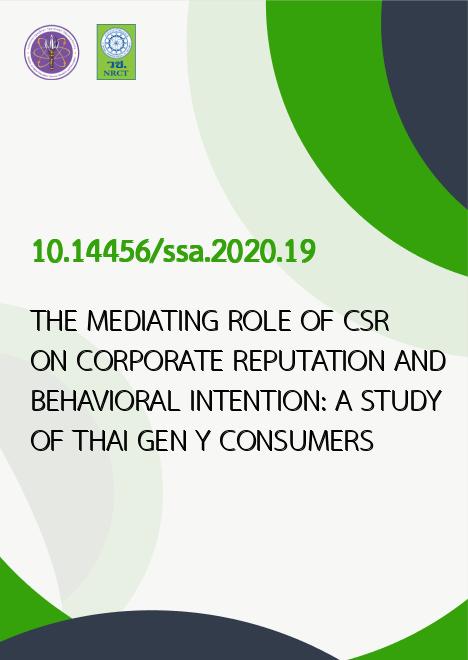
|
THE MEDIATING ROLE OF CSR ON CORPORATE REPUTATION AND BEHAVIORAL INTENTION: A STUDY OF THAI GEN Y CONSUMERS |
|---|---|
| รหัสดีโอไอ | |
| Creator | Napawan Tantivejakul |
| Title | THE MEDIATING ROLE OF CSR ON CORPORATE REPUTATION AND BEHAVIORAL INTENTION: A STUDY OF THAI GEN Y CONSUMERS |
| Publisher | National Research Council of Thailand |
| Publication Year | 2563 |
| Journal Title | SOCIAL SCIENCE ASIA : Official Journal of National Research Council of Thailand (NRCT) in conjunction with ABAC Journal |
| Journal Vol. | 6 |
| Journal No. | 3 |
| Page no. | 13-29 |
| Keyword | corporate social responsibility, perceived fit of values and lifestyles, corporate reputation, behavioral intention, Generation Y |
| URL Website | http://e-journal.nrct.go.th/ |
| Website title | e-journal |
| ISSN | 2229-2608 |
| Abstract | The aim of this study was to investigate the relationship between consumers' perceptions of fit regarding their values and lifestyle, and their perception of corporate social responsibility, corporate reputation, and behavioral intentions. Moreover, the study aims to assess perceived corporate social responsibility as a mediator of the relationships between the investigated variables. A survey was conducted with a sample of 400 respondents from Generation Y in Bangkok. All respondents were aware of the CSR activities which the corporations had been consistently communicating to the public. The research results indicated direct relationships between the perceived fit of values and the perceived corporate social responsibility, between the perceived fit of lifestyles and the perceived corporate social responsibility, and between the perceived corporate social responsibility and the perceived corporate reputation, as well as between the perceived corporate social responsibility and behavioral intentions. In terms of mediation, perceived corporate social responsibility was found to mediate the relationships between the perceived fit of lifestyles and both perceived corporate reputation and consumer behavioral intentions. The results could be re-examined using respondents belonging to different generations in different countries or cultural contexts. Few, if any, studies have been conducted with the same focus. |